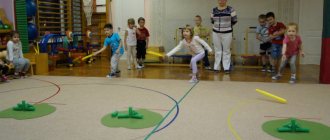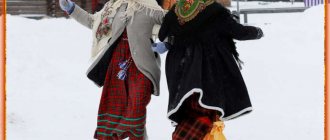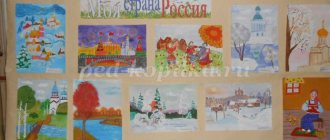The usefulness of folk games
Caring parents, aware of their busyness and inability to fully communicate with their child, try to surround him with a variety of toys. This is good, since the baby should have the opportunity to explore the world around him through the toy. But, more often than not, everything ends with the purchase of toys because adults consider their mission completed. Meanwhile, for a preschooler to play, he must be taught to do so. When a baby can play independently, then he will not need a large number of toys.
What are the best games to offer to children? How to find a game that will unite an adult and a child? Russian folk games will help solve these questions. They have been selected for centuries, and the most beloved and popular ones have come down to us, which are easy to organize in any setting: on vacation, at home. The time has come for modern parents to find out what games their great-grandfathers played and how they are useful for our children.
MAGAZINE Preschooler.RF
Master class for teachers “Russian folk games”Developer: Music director Galina Nikolaevna Uskova MBDOU kindergarten No. 20 “Zemlyanichka” Kstovo, Nizhny Novgorod region
Purpose of the master class: Transfer of experience in organizing and conducting folk games with children to the participants of the master class.
Objectives: Dissemination of pedagogical experience in promoting folk games; improving the professional skills of teachers participating in the master class.
Folk games for children are works of folk art, original customs and traditions. What are the benefits of folk games for children? This is not only a distraction from the worries of the day, relaxation and entertainment. The folk game for children also has additional meaning. It introduces people to the culture and forms affiliation with it. And although in our information, technological age, folk games for children have almost been replaced by computer games, you need to play them with your child. At home, at school, on the playground, in the yard, on holidays, on a walk in kindergarten, etc. Folk games for children, for the most part, are collective games. Thanks to them, the child learns to communicate in a team, negotiate, follow general rules, feel like he belongs to a group, and through play, to a people, a nation. Games are an integral part of the culture of every nation. They have been created over the centuries and accompany the daily lives of children and adults. They helped and still help physical development (endurance, strength, agility are developed, the formation of personal qualities (a sense of responsibility, self-control skills are cultivated).
Outdoor folk games for children are the most valuable means of comprehensive education of a child’s personality. The task (of parents, teachers) is for children to have the opportunity to touch the rich heritage of Russian culture, to experience the joy of it, to feel national identity, to comprehend the originality of the Russian national character, its wonderful original qualities through the example of folk games.
An attractive aspect of organizing games in preschool educational institutions is that they do not require special gaming equipment. The purpose of folk games is to implement an entertainment function: jokes with funny movements and gestures, which are characterized by simplicity and harmlessness. They determine the pedagogical value of games for a child.
Russian folk games for children
The players stand in a circle. Using a counting rhyme, a driver is selected, he receives a stick and stands in the middle of the circle. An adult puts a beautiful cap on his head so that it reaches his nose. Children, holding hands, run in a circle and say: “One, two, three, four, five - the stick will knock . At this time, the driver knocks the stick on the floor. With the last word, the children stop, and the driver extends the stick towards the children. The one to whom the stick points takes hold of its end and calls the driver by name, and he guesses who called him. The game continues with a new driver.
1. Round dance game “Dudar”
Children stand in a circle, choose the leader - Dudar and, holding hands, walk in a circle and sing: “Dudar, Dudar, Dudarishche,
Old, old, old man.
Put it in the deck
It's raw
Rotten him."
After singing the song, they ask:
“Dudar, Dudar, what hurts? "
Dudar answers: “Leg” (or ears, arm, back, neighbor’s nose, neighbor’s heel, etc.)
Everyone in the round dance takes hold of the neighbor’s sore spot, which Dudar said, and again walks in a circle. Do this 3-4 times, after which to the question “What hurts?” , Dudar replies: “Healthy! . " Everyone runs away, and whoever gets caught takes his place.
2. Game "Zarya"
The players form a circle, hold their hands behind their backs, and one of the players, the charger, walks behind him with a ribbon and says:
- Zarya - lightning, red maiden
I walked across the field, dropped my keys,
Blue ribbons, entwined rings - she went for water!
With the last words, the driver carefully places the ribbon on the shoulder of one of the players, who, noticing this, takes the ribbon, and they quickly run in different directions in a circle and try to take an empty seat. Whoever is left without a place becomes the dawn.
3. Game Golden Gate" 1st option.
The two leaders receive names - “moon” and “sun” . They stand facing each other and, joining their hands, raise them up, forming a collar. The rest of the players, holding hands, pass through this gate. The players representing this gate sing:
Golden Gate,
They don't always miss.
The first time - goodbye.
The second time is prohibited,
Well, for the third time,
We won't miss you! - (They lower their hands.)
The one who finds himself outside the gate remains at the “moon” and “sun” . They ask him where he would like to stay: At the “moon” or at the “sun” ? The detainee answers and stands behind the player he chose. Thus, everyone is distributed: some to the “sun” , and some to the “moon” .
When everyone is distributed, the “sun” and the “moon” have a tug-of-war. Whoever wins, that team wins.
Option 2. A pair of players stand facing each other and raise their hands up - this is the goal. The remaining players join hands and form a chain. All the children say:
- Ay, lyuli, ah, lyuli we intertwined our hands
We raised them higher, it turned out beautiful!
The result was not a simple golden gate!
The players - the gates - sing, and the chain must quickly pass between them.
Children - the gates sing:
- The Golden Gate doesn't always let you through
The first time is forgiven, the second is forbidden,
And we won’t miss you the third time!
With these words, hands give up (the gate slams shut). Those who are caught become additional gates. The gate wins if it manages to catch all the players.
4. Game "Pie"
The players are divided into two teams. The teams stand opposite each other. A “pie” sits between them (in a pie cap)
Before the game: nursery rhyme: We greet everyone with bread and salt
We bring the samovar to the table
We don't miss tea
Let's talk about this and that.
Then everyone begins to praise the pie in unison.
-He’s so tall, he’s so soft, he’s so wide, cut him and eat him!
After these words, the players, one from each team, run to the pie. Whoever reaches the goal faster and touches the “pie” takes it with him. A child from the losing team sits in his place. This happens until everyone on one of the teams loses.
And finally, I invite you to play our favorite game.
5. Game “Thread - needle”
Children holding hands stand in a circle. (Ved. - needle, children - thread)
The leader, singing a song, leads the children in different directions (snake, diagonally, keeping the angles)
- And I was walking down a street, down an alley, I found a ball of thread, the thread stretches, it pulls. The ball rolls, rolls, the thread goes on, on, on, the ball goes on, on, on, on! The song is repeated as many times as the teacher wants. At the end, the leader begins to walk in a circle, twisting a ball of “thread” so that it is tight. Then the children raise their hands. the glomerulus begins to develop, forming a circle again, the needle connects with the thread. Everyone says the words, swinging their hands: “I took the thread, the thin thread broke!” (separate hands)
6. Game "Russian"
To the accompaniment of cheerful music, children move hops around the hall (or area) in different directions, without bumping into each other. When the music ends, they form pairs holding hands. The children come up to the child who is left without a partner and speak. “One, two, three, you are disheveled!” After this, the game continues again.
| Next > |
Traditional Russian fun
On holidays, among Russian folk games, entertainment with a large number of participants was popular, when they could divide into groups and compete with each other. From time immemorial, games with a competitive element have been loved by children of different ages, as they provide an opportunity to test their strength, luck, and dexterity. Such traditional Russian games include “Burners”, “Pull the String”, “Chains” and similar ones.
Game "Drag the String"
In the game “Pull the String,” two hoops are placed on the sides of the court. A rope is stretched along the ground so that its ends are in the middle of each hoop. Preschool children are divided into two groups. The participants of each of them, in turn, stand in their hoop, then, at a signal from the driver (an adult or an older child): “One, two, three, run!”, they change hoops, trying to reach the opponent’s place as quickly as possible and pull the rope. The one who completes the actions faster and without errors becomes the winner. Following the first pair, the second runs, then the third, and so on until the end.
The team whose members were faster and pulled the rope more often wins. An adult must participate in this competition to ensure that the rules are followed.
Game "Burners"
In the classic game "Burners", players stand in pairs in a column. Raised hands form a “gate” through which all couples pass. In front of everyone, with his back to the other players, stands the driver, who is also called the “burning one.” The players say the nursery rhyme in chorus: “Burn, burn clearly, So that it doesn’t go out! Look at the sky, Birds are flying, Bells are ringing. Ding-dong, ding-dong, quickly run out! " At the last words, the children in the pair in front scatter in different directions, the rest shout in unison: “One, two, don’t be a crow, but run like fire!” “The driver turns around and catches up with the fleeing children.
If the players manage to take each other’s hands, and the “burning” one is left with nothing, then they again stand behind the column. The driver again catches or “burns” another pair: the game is repeated.
If it is possible to catch one of the fleeing players, then a new pair is formed. The player who is left without a pair becomes the driver.
Game "Chains"
In Chains, players also form two teams. With a little counting table, for example: “A cuckoo walked past the net, And behind it were little children. The cuckoos are asked to drink. Come out - you'll drive! ", select the "breaker" who will break the "chain". The teams are located opposite each other, the participants hold hands tightly. The driver scatters, runs towards the “chain” of opponents, trying to destroy it.
If successful, he takes the opponent to his group; if it doesn’t work out, he himself remains with the opponents. The team with the most players is the winner.
Quite a lot of similar entertainment has been collected and stored in the national treasury. Most of them are relevant and loved today, for example:
- "Geese-geese";
- "Hide and Seek";
- "Cossacks-robbers";
- "Salki";
- "Blind Man's Bluff";
- "Ring".
Others - “Pleten”, “Ringer”, “Lapta” and others are half-forgotten, have more complex rules that need to be memorized with the children first. Every parent can prepare exciting games, fun, and entertainment for children's parties. It all depends on the interest and desire of the adults themselves.






